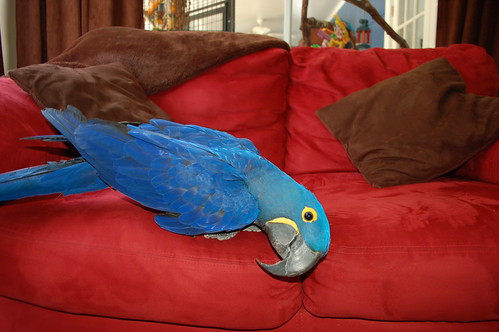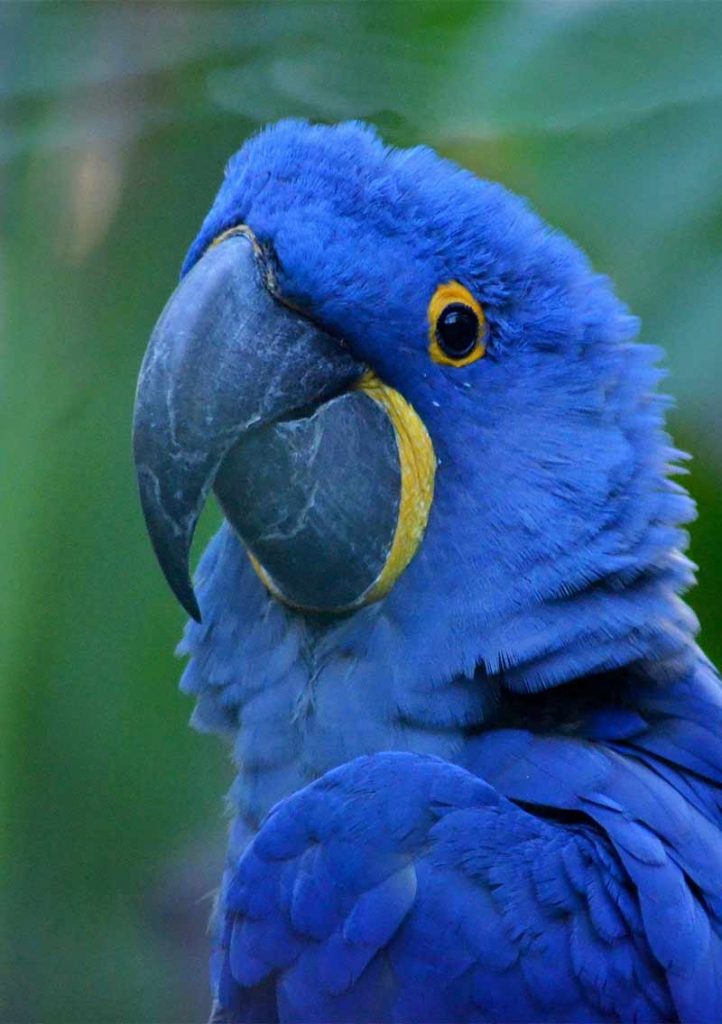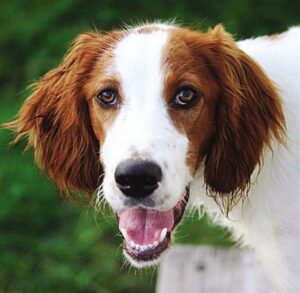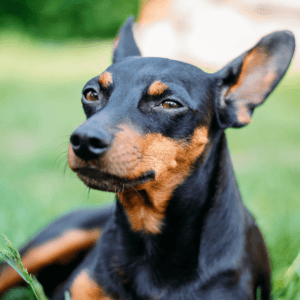Key Takeaways
- Hyacinth macaws are the largest parrots, known for their vibrant blue plumage and friendly nature.
- Adopting a hyacinth macaw can cost between $10,000 and $15,000, largely due to their rarity and care needs.
- These birds require a high-fat diet, large living space, and plenty of mental stimulation.
- Hyacinth macaws are considered vulnerable in the wild, with only about 4,300 adults left.
- Though not aggressive, they demand significant time and attention, making them suitable for dedicated owners.
The Rare and Stunning Hyacinth Macaw: Why They Capture Our Hearts and Wallets
Hyacinth macaws are nothing short of spectacular. Known for their deep cobalt blue feathers and striking yellow accents, these parrots are a true marvel of nature. As the largest of all parrots, they can grow up to 40 inches long, with a wingspan reaching nearly 60 inches. But beyond their size and beauty, it’s their intelligence and affectionate nature that truly captivates bird enthusiasts worldwide.

“Hyacinth Macaw’s Training Success” from birdtricksstore.com and used with no modifications.
However, owning a hyacinth macaw is not for everyone. Their rarity and specialized care needs make them one of the most expensive parrots to adopt. For those who are committed, these birds can become lifelong companions, offering a unique bond and endless entertainment.
“Their appearance is the perfect combination of grace and exotics, and these birds will captivate you with the deep cobalt blue which covers them.”
Overview of Hyacinth Macaw Adoption
Adopting a hyacinth macaw is a significant decision that requires careful consideration. These birds are not only a financial investment but also a long-term commitment, as they can live up to 50 years or more. It’s essential to ensure you have the resources and dedication to provide them with the care they need.
When considering adoption, it’s crucial to understand the unique requirements of these majestic birds. From their dietary needs to their housing and social interaction, hyacinth macaws demand a lot from their owners. But for those who are prepared, the rewards are immeasurable. If you’re considering this journey, learning about the pet adoption journey can provide valuable insights.
The Allure of Hyacinth Macaws
What makes hyacinth macaws so alluring? It’s a combination of their stunning appearance, gentle demeanor, and playful nature. These birds are known for their ability to mimic human speech and sounds, making them excellent companions. Their intelligence allows them to learn tricks and solve puzzles, providing endless entertainment for both the bird and the owner. For those considering adopting a rescue pet, understanding the rescue pet adoption journey can be invaluable.
Besides that, their social nature means they thrive on interaction, often forming strong bonds with their human companions. This connection is one of the many reasons why hyacinth macaws are highly sought after as pets.
Understanding the High Cost of Adoption
The price tag for adopting a hyacinth macaw can be staggering, often ranging from $10,000 to $15,000. But why are these birds so expensive? Several factors contribute to their high cost, including their rarity, specialized care needs, and the legal restrictions surrounding their trade.
Factors Contributing to Price
Firstly, hyacinth macaws are listed as vulnerable in the wild, which limits their availability. The International Union for Conservation of Nature (IUCN) estimates there are only about 4,300 adult hyacinth macaws left in the wild. This rarity drives up their price in the pet market.
Secondly, their care requirements are demanding. Hyacinth macaws need a specific diet, large living spaces, and plenty of mental stimulation. Providing these necessities can be costly, adding to the overall expense of owning one.
Availability and Waiting Lists
Because of their limited numbers, potential owners often face long waiting lists when trying to adopt a hyacinth macaw. Breeders who specialize in these birds may only have a few available each year, leading to increased demand and higher prices.
Comparative Cost Analysis with Other Parrots
When compared to other parrot species, hyacinth macaws are among the most expensive. For instance, African Grey parrots, another popular species, typically cost between $500 and $2,000. This stark difference highlights the unique challenges and considerations involved in adopting a hyacinth macaw.
Caring for Your Hyacinth Macaw
Once you’ve decided to adopt a hyacinth macaw, understanding their care needs is crucial. These birds require more than just food and shelter; they need an environment that supports their physical and mental well-being.
Dietary Needs and Recommendations
Hyacinth macaws have specific dietary requirements that must be met to ensure their health and longevity. Their diet should consist of a high-fat content, including nuts like macadamia and Brazil nuts, as well as fresh fruits and vegetables.
Regular access to clean water is essential, and it’s important to avoid feeding them foods that are toxic to birds, such as chocolate, caffeine, and avocado. By providing a balanced diet, you can help your hyacinth macaw thrive.
Essential Housing Requirements
Providing suitable housing for a hyacinth macaw is essential to its health and happiness. These large birds require spacious enclosures that allow them to spread their wings and move freely. A cage that is at least 6 feet tall, 4 feet wide, and 8 feet long is recommended. This ensures they have enough room to exercise and explore their environment.
“Their large size gives ensures these pet birds are strong and healthy. Hyacinth macaws are endurable and rarely become ill, as long as you follow some basic rules of parrot care, which means avoiding the draft and excessive heat or cold.”
Besides size, the cage should be made of sturdy materials that can withstand the strong beaks of hyacinth macaws. Stainless steel is a good option, as it’s durable and easy to clean. Inside the cage, include a variety of perches, toys, and foraging opportunities to keep your bird mentally stimulated.
It’s also important to provide a safe and comfortable sleeping area. Covering the cage at night can help create a sense of security and ensure your macaw gets the rest it needs. For more tips on preparing your home for a pet, check out this rescue pet home preparation guide.
Exercise and Mental Stimulation
Exercise and mental stimulation are crucial for the well-being of hyacinth macaws. These intelligent birds require daily out-of-cage time to stretch their wings and interact with their environment. Aim for at least 2-3 hours of supervised free flight or playtime each day.
Engage your macaw with puzzle toys, training sessions, and interactive play to keep their minds sharp. Teaching them new tricks or commands can be a rewarding experience for both you and your bird. Remember, a bored macaw can become destructive, so it’s important to provide plenty of activities to keep them entertained.

“Hyacinth Macaw (facts and care) – Pets …” from pets-society.com and used with no modifications.
The Beauty and Unique Characteristics that Make Them Stand Out
Hyacinth macaws are renowned for their striking beauty and unique characteristics. Their vibrant plumage and engaging personalities make them stand out in the avian world, much like the Angora rabbit in the world of mammals.
Vibrant Plumage and Physical Appearance
The deep blue feathers of the hyacinth macaw are truly mesmerizing. Accented with bright yellow around their eyes and beak, these birds are a visual spectacle. Their large size and powerful beak add to their majestic appearance, making them one of the most sought-after parrots for bird enthusiasts.
Behavior and Social Traits
Hyacinth macaws are known for their friendly and social nature. They thrive on interaction and enjoy spending time with their human companions. These birds are excellent at mimicking sounds and can learn to speak a variety of words and phrases. Their playful demeanor and intelligence make them delightful companions, always eager to engage in activities and games.
Life Expectancy and Lifelong Companionship
One of the most remarkable aspects of owning a hyacinth macaw is their long lifespan. These birds can live for 50 years or more, making them a lifelong companion for dedicated owners. It’s important to consider this commitment before adopting, as they will require care and attention throughout their lives.
The bond formed with a hyacinth macaw can be incredibly rewarding, as they become a cherished member of the family. Their loyalty and affection make them a beloved pet for those who are prepared for the responsibility.
Current Population and Conservation Status
The hyacinth macaw is currently classified as vulnerable, with their population facing several threats in the wild. Habitat loss, illegal trapping, and the pet trade have all contributed to their declining numbers.
Wild Population Statistics
According to the International Union for Conservation of Nature (IUCN), there are approximately 4,300 adult hyacinth macaws left in the wild. This alarming statistic highlights the need for conservation efforts to protect these magnificent birds and their habitats.
- Hyacinth macaws are primarily found in Brazil, with smaller populations in Bolivia and Paraguay.
- They inhabit areas such as the Pantanal, Cerrado, and Amazon regions.
- Their population is fragmented, with many isolated groups facing threats from human activity.
Conservationists are working tirelessly to preserve these birds and their natural environments. Efforts include habitat restoration, anti-poaching measures, and breeding programs to increase their numbers.
Conservation Efforts and Challenges
Despite ongoing efforts, significant challenges remain in conserving hyacinth macaws. Habitat destruction due to agriculture and logging continues to threaten their survival. Illegal trade and poaching also pose risks, as these birds are highly sought after in the exotic pet market.
To combat these issues, organizations are collaborating with local communities to promote sustainable practices and raise awareness about the importance of protecting these birds. Through education and conservation initiatives, there is hope for the future of the hyacinth macaw.
Are Hyacinth Macaws Suitable Pets?
Deciding whether a hyacinth macaw is a suitable pet depends on various factors. These birds are not for everyone, as they require significant time, resources, and dedication.
Potential owners should evaluate their ability to meet the needs of these birds, including providing a spacious living environment, a specialized diet, and daily interaction. Hyacinth macaws can be demanding pets, but for those who are prepared, they offer a rewarding and lifelong companionship.
Evaluating Their Temperament
Hyacinth macaws are known for their gentle and affectionate temperament. They are naturally curious and enjoy interacting with their human companions, making them excellent pets for those who can dedicate time to their care. These birds are not typically aggressive, but they do require proper socialization and training to ensure they remain well-behaved.
One of the key traits of hyacinth macaws is their ability to bond closely with their owners. They are highly social creatures and thrive on interaction, often following their favorite person around the house. This bond can be incredibly rewarding, but it’s important to remember that it requires a significant time investment.
Commitment and Lifestyle Compatibility: Is it Ethical To Have Them As Pets?
Owning a hyacinth macaw is a long-term commitment that should not be taken lightly. These birds can live for 50 years or more, and they require consistent care and attention throughout their lives. Prospective owners should evaluate their ability to provide for these needs before deciding to adopt.
In terms of ethical considerations, it’s important to ensure that any hyacinth macaw you adopt has been bred in captivity and not taken from the wild. Supporting responsible breeders who prioritize the health and well-being of their birds is crucial. Additionally, potential owners should consider the conservation status of these birds and the impact of their decision on the species as a whole.
Why Hyacinth Macaws Are So Popular
The popularity of hyacinth macaws can be attributed to several factors, including their striking appearance, engaging personalities, and the unique bond they form with their owners. These birds are truly one-of-a-kind, offering a level of companionship that few other pets can match.
Hyacinth macaws are not only visually stunning but also incredibly intelligent. Their ability to mimic sounds and learn tricks makes them fascinating companions. This combination of beauty and brains has made them a favorite among bird enthusiasts worldwide.
Affectionate Nature and Bonding with Owners
One of the most endearing qualities of hyacinth macaws is their affectionate nature. These birds are known for forming strong bonds with their human companions, often seeking out interaction and attention. This bond can be incredibly rewarding, providing both the bird and owner with a sense of companionship and mutual understanding. For those considering bringing a new pet into their home, understanding the home preparation guide can be essential to fostering such a relationship.
It’s important to nurture this bond through regular interaction and socialization. Spending time with your macaw, teaching them new tricks, and engaging in play are all ways to strengthen your relationship and ensure a happy and healthy pet.
Their Role in Avian Enthusiast Communities
“Hyacinth macaws have become a symbol of the exotic bird community, admired for their beauty and intelligence. They often serve as ambassadors for conservation efforts, raising awareness about the importance of protecting these incredible creatures and their habitats.”
Within avian enthusiast communities, hyacinth macaws hold a special place. Their unique characteristics and captivating personalities make them a favorite topic of discussion and admiration. These birds often participate in bird shows and exhibitions, showcasing their talents and beauty to a wider audience.
Beyond their role as pets, hyacinth macaws play an important part in conservation efforts. By raising awareness about their vulnerability in the wild, these birds help promote initiatives aimed at preserving their species and natural habitats.
Frequently Asked Questions
For those considering adopting a hyacinth macaw, several questions often arise. Here are some of the most common inquiries and their answers to help guide potential owners in making informed decisions. For more details on this fascinating bird, check out the WebMD page on hyacinth macaws.
Why are Hyacinth Macaws so expensive?
The high cost of hyacinth macaws is primarily due to their rarity and the specialized care they require. As a vulnerable species, their numbers in the wild are limited, which increases their value in the pet market. Additionally, their dietary needs, housing requirements, and long lifespan all contribute to the overall expense of owning one.
Potential owners should also consider the ethical implications of purchasing such a rare bird. It’s important to ensure that any hyacinth macaw you adopt has been bred responsibly and not taken from the wild. For more insights, you can explore common pet adoption myths to make informed decisions.
“Hyacinth macaws are listed in the Convention on International Trade in Endangered Species of Wild Fauna and Flora (CITES), an international agreement regarding trade of wild animals and plants.”
What do Hyacinth Macaws eat?
Hyacinth macaws have specific dietary needs that must be met to ensure their health and well-being. Their diet should consist of a high-fat content, including nuts like macadamia, Brazil nuts, and walnuts. Fresh fruits and vegetables should also be included to provide essential vitamins and minerals.
It’s crucial to avoid feeding them foods that are toxic to birds, such as chocolate, caffeine, and avocado. Providing a balanced diet will help your hyacinth macaw thrive and maintain its vibrant plumage.
How long do Hyacinth Macaws live?
Hyacinth macaws are known for their impressive lifespan, often living for 50 years or more. This longevity makes them a lifelong companion for dedicated owners, but it also requires a long-term commitment to their care and well-being.
To ensure your macaw lives a long and healthy life, it’s important to provide them with proper nutrition, a suitable living environment, and regular veterinary care. By meeting these needs, you can enjoy many years of companionship with your feathered friend.
Are Hyacinth Macaws aggressive?
Hyacinth macaws are generally not aggressive, but they do require proper socialization and training to ensure they remain well-behaved. These birds are naturally curious and enjoy interacting with their human companions, making them excellent pets for those who can dedicate time to their care.
It’s important to establish a routine and set boundaries to prevent any undesirable behaviors. With patience and consistency, hyacinth macaws can become loving and well-adjusted members of the family.


